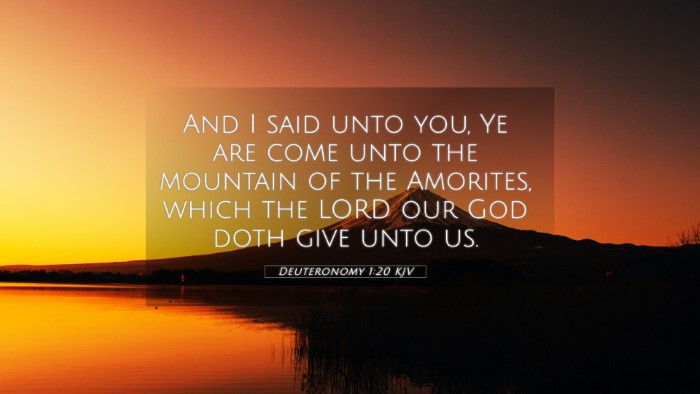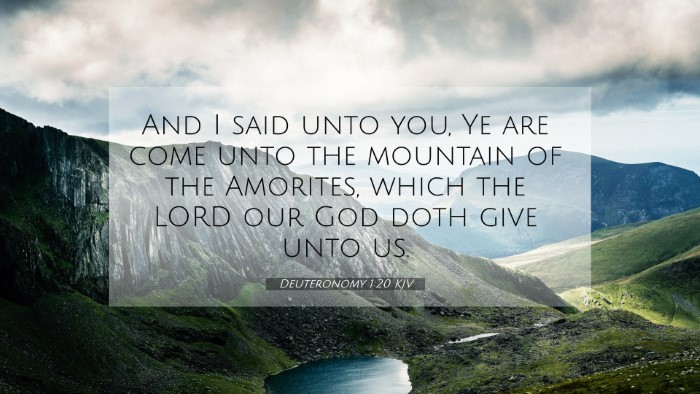Understanding Deuteronomy 1:20
Verse: “And I said unto you, Ye are come unto the mountain of the Amorites, which the LORD our God doth give unto us.”
Summary and Explanation
The verse Deuteronomy 1:20 marks a significant moment in the journey of the Israelites as they approach the Promised Land. This declaration not only signifies their geographical proximity to the land but also emphasizes God’s promise to them. It reflects the transition from the wilderness experience to the fulfillment of God's covenant. The leaders of Israel are reminded of their divine calling to possess the land promised by God, known as the mountain of the Amorites, a stronghold they are to enter.
Insights from Commentaries
Matthew Henry:
Matthew Henry highlights the importance of remembrance in this passage. He emphasizes that Moses, through his speech, reminds the people of the Lord’s promise and the necessity of taking possession of the land. He draws attention to the act of obeying God's command as integral to their success in conquering the Amorites. Henry notes that this moment acts as both a call to action and a poignant reminder of divine deliverance.
Albert Barnes:
Albert Barnes offers an interpretation that focuses on God’s sovereignty and the people's responsibility. He comments on the significance of “the mountain of the Amorites” as a location that represents not just physical territory, but a spiritual aspiration for the Israelites. Barnes underscores that God is providing them with a land, but they must demonstrate faith and commitment in order to realize this promise.
Adam Clarke:
Adam Clarke provides a historical context, explaining that the Amorites were known for their formidable strength. He discusses God’s reassurance to the Israelites amid these formidable foes. Clarke points out that this verse signifies a pivotal moment that symbolizes the faithful transition from hope to action, showcasing God’s providence and the need for the Israelites to trust in His capabilities against overwhelming odds.
Related Bible Cross-References
- Joshua 1:2: “Moses my servant is dead; now therefore arise, go over this Jordan, thou and all this people, unto the land which I do give to them, even to the children of Israel.”
- Exodus 3:8: “And I am come down to deliver them out of the hand of the Egyptians, and to bring them up out of that land unto a good land and a large, unto a land flowing with milk and honey...”
- Numbers 13:30: “And Caleb stilled the people before Moses, and said, Let us go up at once, and possess it; for we are well able to overcome it.”
- Deuteronomy 9:1: “Hear, O Israel: Thou art to pass over Jordan this day, to go in to possess nations greater and mightier than thyself...”
- Hebrews 4:1: “Let us therefore fear, lest, a promise being left us of entering into his rest, any of you should seem to come short of it.”
- Psalm 105:44: “And gave them the lands of the heathen; and they inherited the labor of the people.”
- Numbers 14:9: “Only rebel not ye against the LORD, neither fear ye the people of the land; for they are bread for us: their defense is departed from them, and the LORD is with us: fear them not.”
Thematic Connections
This verse connects deeply with themes such as divine guidance, the faithfulness of God, and the concept of promised inheritance. The journey of the Israelites serves as a metaphor for spiritual growth and maturation for believers today, highlighting the importance of faith, obedience, and God’s promises.
Cross-Referencing Biblical Texts
The act of cross-referencing biblical texts enhances one’s understanding of scripture, allowing for a richer interpretation of verses such as Deuteronomy 1:20. By exploring the mentioned cross-references, readers can see how God's promises span across both the Old and New Testaments, weaving a continual narrative of hope, deliverance, and faith.
Conclusion
Deuteronomy 1:20 is a powerful reminder of God’s faithfulness and the importance of seizing the spiritual territories that God has promised to us. Through careful study and cross-referencing, believers can gain deeper insights into God’s word, leading to a more profound understanding of scripture and its application in their lives.



